Please fill out the following information, and RRFC Admissions will contact you to discuss our program offerings:
Issue #157
by L. Swift and Jeff McQ
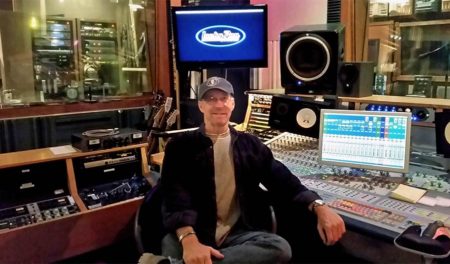 Just goes to show, you never know who might be calling you. Recording Connection mentor, engineer/producer Michael Mikulka contacted us to say, “We had the privilege of working with the fine musicians in Lady Gaga’s band doing overdubs for material used in her Super Bowl show. The guys in the band, the road crew, the drivers and the management were terrific. These players were fantastic.”
Just goes to show, you never know who might be calling you. Recording Connection mentor, engineer/producer Michael Mikulka contacted us to say, “We had the privilege of working with the fine musicians in Lady Gaga’s band doing overdubs for material used in her Super Bowl show. The guys in the band, the road crew, the drivers and the management were terrific. These players were fantastic.”
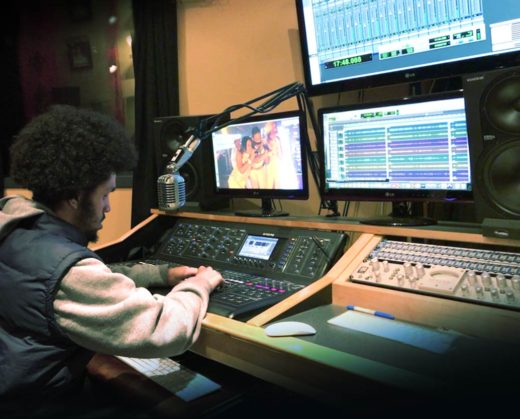 “I have videos of him running sessions, micing a drum set,” Joey continues. “He runs my entire console totally blind. I put his hands on the faders, I showed him where different things were, and he runs entire sessions…He doesn’t use a mouse, he uses a voiceover utility where the computer talks to him and it tells him how to raise and lower volumes or pan things or add effects to things.”
One of the reasons for Angel’s recent successes behind the board is that he has never treated his impairment as an excuse—a quality for which he gives his mother, Angelica, plenty of credit.
“I have never been coddled,” says Angel. “Everything that I currently have and, you know, hope to gain, I’ve gained on my own. I’ve never been the one to take handouts…I’ve always been like that…My mom has always been a huge advocate of me doing what I want. She’s one of the reasons I’ve learned to push, and push, and push, and fight for what I need.”
Growing up with four siblings in the high-crime Kensington section of Philadelphia may also have contributed to Angel’s no-excuses mentality. “I think I’m more driven…because I don’t have a lot of the opportunities that everyone else does,” he says. “Everyone takes a lot of things for granted, and I’ve never been that way.”
Angel says his passion for audio engineering surfaced in high school, when he started recording some of his own music on Garage Band, as well as helping some of his friends with their stuff as a hobby. “I could work on the littlest problems for like hours and hours and hours at a time,” he says. “It got to the point to where I would forget to eat, you know, stuff like that. So I realized that I had a really huge passion for it.”
When Angel started applying to colleges to learn audio engineering, however, he ran into some major hurdles. “One school I didn’t get into because…they weren’t unable to accommodate my lack of vision,” he says, “And the other that I applied to audio engineering, I didn’t get in because I didn’t have enough money…I got depressed, I’m not going to lie.”
Angel says his mom came to the rescue. “She’s like, ‘Let’s look at all the alternatives that we could do because I know you don’t want to go into debt,’” he says. “She was like, ‘Let’s find something. We’re going to get you somewhere. Don’t worry.’
Their search for alternatives led to the Recording Connection and the opportunity to learn on-the-job. “I was a bit skeptical,” Angel admits. “To be honest, I went, ‘Now this is too good to be true.'”
Nevertheless, from his first in-studio studio interview with Joey Heier, all his concerns were put to rest. “My mom was just in awe of the studio,” he says. “I think she could tell in my face that like this is where I kind of need to be…I said to my mom, ‘I really hope he takes me.’”
Indeed, Angel got accepted and began his apprenticeship with Joey at Crystal Clear. Shortly after he started, however, Angel had the opportunity to attend a federally funded program for blind engineers called “I See Music” in Chicago, and took a few weeks off to attend. When he got back, the tools and techniques he’d acquired propelled him forward. He completed the basic bachelor-equivalent course in a couple of months, a pace that even astounded his mentor.
“The productivity of a blind engineer has been bettered tenfold,” says Angel. “I came back to Joey and he was like, ‘Is there any reason why you’re doing like four or five lessons at one time?’ I was like, ‘No. If I understand it, you know, I’m going to take the quiz.’”
Angel has stayed on with Joey to take the Recording Connection master’s course, giving him even more hands-on experience tracking bands and participating on real sessions. Meanwhile, he’s keeping a very busy schedule between actively looking for a studio job, taking on clients in his own in his home studio, and even working on his own EP to be released in the spring. As for his long-term plans?
“My end goal is to open up my own place,” he says. “I feel like a lot of the times for a blind person to kind of make it in any industry, they have to be their own entrepreneur. So my goal is I want a beautiful place. I want a beautiful studio.”
In the meantime, Angel marvels at the progress he’s made toward his career in the past year, thanks to his apprenticeship and training in the studio with Joey.
“I have a lot more confidence now,” he says. “I knew that I wanted to be in music, but I didn’t know how I was going to get there. I didn’t have a road. I didn’t have a stepping stone to point me in the right direction… I don’t know what made [Joey] decide to take me as a student, but I’m eternally grateful.”
“I have videos of him running sessions, micing a drum set,” Joey continues. “He runs my entire console totally blind. I put his hands on the faders, I showed him where different things were, and he runs entire sessions…He doesn’t use a mouse, he uses a voiceover utility where the computer talks to him and it tells him how to raise and lower volumes or pan things or add effects to things.”
One of the reasons for Angel’s recent successes behind the board is that he has never treated his impairment as an excuse—a quality for which he gives his mother, Angelica, plenty of credit.
“I have never been coddled,” says Angel. “Everything that I currently have and, you know, hope to gain, I’ve gained on my own. I’ve never been the one to take handouts…I’ve always been like that…My mom has always been a huge advocate of me doing what I want. She’s one of the reasons I’ve learned to push, and push, and push, and fight for what I need.”
Growing up with four siblings in the high-crime Kensington section of Philadelphia may also have contributed to Angel’s no-excuses mentality. “I think I’m more driven…because I don’t have a lot of the opportunities that everyone else does,” he says. “Everyone takes a lot of things for granted, and I’ve never been that way.”
Angel says his passion for audio engineering surfaced in high school, when he started recording some of his own music on Garage Band, as well as helping some of his friends with their stuff as a hobby. “I could work on the littlest problems for like hours and hours and hours at a time,” he says. “It got to the point to where I would forget to eat, you know, stuff like that. So I realized that I had a really huge passion for it.”
When Angel started applying to colleges to learn audio engineering, however, he ran into some major hurdles. “One school I didn’t get into because…they weren’t unable to accommodate my lack of vision,” he says, “And the other that I applied to audio engineering, I didn’t get in because I didn’t have enough money…I got depressed, I’m not going to lie.”
Angel says his mom came to the rescue. “She’s like, ‘Let’s look at all the alternatives that we could do because I know you don’t want to go into debt,’” he says. “She was like, ‘Let’s find something. We’re going to get you somewhere. Don’t worry.’
Their search for alternatives led to the Recording Connection and the opportunity to learn on-the-job. “I was a bit skeptical,” Angel admits. “To be honest, I went, ‘Now this is too good to be true.'”
Nevertheless, from his first in-studio studio interview with Joey Heier, all his concerns were put to rest. “My mom was just in awe of the studio,” he says. “I think she could tell in my face that like this is where I kind of need to be…I said to my mom, ‘I really hope he takes me.’”
Indeed, Angel got accepted and began his apprenticeship with Joey at Crystal Clear. Shortly after he started, however, Angel had the opportunity to attend a federally funded program for blind engineers called “I See Music” in Chicago, and took a few weeks off to attend. When he got back, the tools and techniques he’d acquired propelled him forward. He completed the basic bachelor-equivalent course in a couple of months, a pace that even astounded his mentor.
“The productivity of a blind engineer has been bettered tenfold,” says Angel. “I came back to Joey and he was like, ‘Is there any reason why you’re doing like four or five lessons at one time?’ I was like, ‘No. If I understand it, you know, I’m going to take the quiz.’”
Angel has stayed on with Joey to take the Recording Connection master’s course, giving him even more hands-on experience tracking bands and participating on real sessions. Meanwhile, he’s keeping a very busy schedule between actively looking for a studio job, taking on clients in his own in his home studio, and even working on his own EP to be released in the spring. As for his long-term plans?
“My end goal is to open up my own place,” he says. “I feel like a lot of the times for a blind person to kind of make it in any industry, they have to be their own entrepreneur. So my goal is I want a beautiful place. I want a beautiful studio.”
In the meantime, Angel marvels at the progress he’s made toward his career in the past year, thanks to his apprenticeship and training in the studio with Joey.
“I have a lot more confidence now,” he says. “I knew that I wanted to be in music, but I didn’t know how I was going to get there. I didn’t have a road. I didn’t have a stepping stone to point me in the right direction… I don’t know what made [Joey] decide to take me as a student, but I’m eternally grateful.”
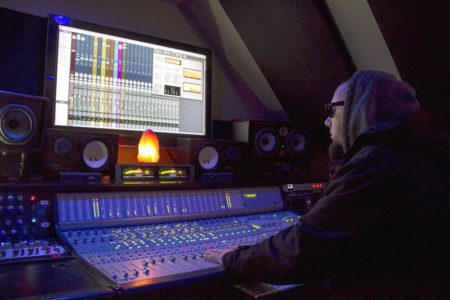 RRFC: So can you tell us the story of how you got into recording?
Andrew Clifford: Well, my father’s a jazz guitarist, so I was always either at shows or at his lessons, or recording sessions, or something. And so I was just always around music and grew up around music, and started playing drums at a young age…A friend of mine works out of New York, out of a few major studios there, and he liked the sound that I was getting when I was experimenting on just a little home setup that I had. And [he] brought me into a larger studio, and honestly I didn’t really know what I was doing at that point…the engineers there, I explained to them that I wanted to kind of capture a sound, but I was just honest with them and didn’t know what I was doing. And so they took me under their wing, and I learned under some Grammy-Award winning engineers, and it was just an incredible experience, you know?
I kind of took a different route. I went to college for music education and performance in jazz studies and stuff. So I never really went to school for audio per se, but this is kind of like the other road, I guess you’d say for engineering, and it was a great experience.
RRFC: So the guys that you trained with, do you think that they took a shine to you because you were so honest about your lack of experience?
Andrew: Yes, absolutely…In the industry, sometimes it’s who you know, but I think it’s also no matter what connections you have, it’s also your attitude and your vibe in the studio. And I think coming in…just showing up and automatically being a producer without the knowledge that I should’ve had, had I had any other approach, it would’ve had a negative effect…I think they respected the fact that I just was blatantly honest about, you know, I needed to grow on the technical side of things. And that’s when they kind of took me under their wing…I knew I had the drive and I knew I would figure it out, I just needed the right people on my side to help me overcome the technical barrier.
RRFC: So, fast forward to now—you’re running your own studio. What drew you to become a Recording Connection mentor?
Andrew: I really dug the background of the whole Recording Connection’s mission statement and, you know, some of the people that you guys have been working with. And then of course, once we got into it with the class plans, I really dug how it was laid out. The chapters made sense to me. I feel like the students really gravitated towards—you’ve got the textbook side of things, but then being in the studio and applying some of those things they learn through our textbooks, you know, and seeing them done…Not only are they using it from a reading standpoint, but they’re in the field seeing it done, and then hearing the results. So it was nicely laid out.
RRFC: What are some of the projects you’re working on in the studio now?
Andrew: Too much to really list off, but yeah, I’m working with a bunch of different great artists. I’m working with this group, my own group, called Green Tank. We’re putting out a project that’s working with many artists across America, Wu-Tang affiliated artists. I’m working with different musicians, Nigel Hall is another one who works with Soul Live and Lettuce. He just got a Grammy…this past year, and he’s extremely talented and a close friend of mine. We just worked with Jeff Coffin of Dave Matthews Band. I got to perform with him too. He’s been a friend of mine for over a decade.
RRFC: What is your take on the mentorship process? Why do you feel mentorship is important?
Andrew: I think I’m all about educational experience. Like from my experience being in New York, and having been given the chance under people that could’ve easily just said, “Get the hell out of my studio,” you know?—It’s kind of giving back in a sense, remembering how they treated me, and trying to give back a little bit as well, and keeping that in the back of my mind as we’re going through sessions, and classes, and stuff like that…trying to always keep in mind the little things that they might keep with them as they go into the studio, or build their own home studio, whatever they might do in the future.
RRFC: What qualities do you look for when you’re thinking of taking someone on as an apprentice?
Andrew: It’s really just about the personality, I think. If they’re willing to learn, that’s the first thing. Knowing when to kind of just observe is an important thing in the studio. You know, not necessarily shouting out or, you know, if the producer’s talking to somebody through a talkback mic, not to over-shine and talk when you’re not supposed to, that type of thing…I’ve never really had a bad student. It’s just how…I think it’s more about the instructor, how you approach teaching the particular [student] because everybody learns differently.
RRFC: When you’re working with an apprentice in the studio, what are some studio etiquette rules you want them to know?
Andrew: I think the biggest mistake—and this hasn’t happened much in the studio, but it’s happened a couple times is just—if you’re in a session, just knowing when to chime in and when not to, you know?…Be a fly on the wall…and write all your questions down. Like I have no problem, you know, answering the question after the session or maybe at the next one-on-one class, or something like that. Write the questions down: Why did I use that mic? Why did I use this chain? Why was this effect on here? Why did this sound like this? Write everything in a notebook, and I think that’s the best approach. And the studio engineer, or producer, whoever you’re working with in the future after that session will appreciate the fact that you didn’t chime in right at that moment…It doesn’t happen all the time, but I would say that that’s probably one of the more frustrating things that could happen in the studio because it kind of stops the workflow for the client, you know?
RRFC: So can you tell us the story of how you got into recording?
Andrew Clifford: Well, my father’s a jazz guitarist, so I was always either at shows or at his lessons, or recording sessions, or something. And so I was just always around music and grew up around music, and started playing drums at a young age…A friend of mine works out of New York, out of a few major studios there, and he liked the sound that I was getting when I was experimenting on just a little home setup that I had. And [he] brought me into a larger studio, and honestly I didn’t really know what I was doing at that point…the engineers there, I explained to them that I wanted to kind of capture a sound, but I was just honest with them and didn’t know what I was doing. And so they took me under their wing, and I learned under some Grammy-Award winning engineers, and it was just an incredible experience, you know?
I kind of took a different route. I went to college for music education and performance in jazz studies and stuff. So I never really went to school for audio per se, but this is kind of like the other road, I guess you’d say for engineering, and it was a great experience.
RRFC: So the guys that you trained with, do you think that they took a shine to you because you were so honest about your lack of experience?
Andrew: Yes, absolutely…In the industry, sometimes it’s who you know, but I think it’s also no matter what connections you have, it’s also your attitude and your vibe in the studio. And I think coming in…just showing up and automatically being a producer without the knowledge that I should’ve had, had I had any other approach, it would’ve had a negative effect…I think they respected the fact that I just was blatantly honest about, you know, I needed to grow on the technical side of things. And that’s when they kind of took me under their wing…I knew I had the drive and I knew I would figure it out, I just needed the right people on my side to help me overcome the technical barrier.
RRFC: So, fast forward to now—you’re running your own studio. What drew you to become a Recording Connection mentor?
Andrew: I really dug the background of the whole Recording Connection’s mission statement and, you know, some of the people that you guys have been working with. And then of course, once we got into it with the class plans, I really dug how it was laid out. The chapters made sense to me. I feel like the students really gravitated towards—you’ve got the textbook side of things, but then being in the studio and applying some of those things they learn through our textbooks, you know, and seeing them done…Not only are they using it from a reading standpoint, but they’re in the field seeing it done, and then hearing the results. So it was nicely laid out.
RRFC: What are some of the projects you’re working on in the studio now?
Andrew: Too much to really list off, but yeah, I’m working with a bunch of different great artists. I’m working with this group, my own group, called Green Tank. We’re putting out a project that’s working with many artists across America, Wu-Tang affiliated artists. I’m working with different musicians, Nigel Hall is another one who works with Soul Live and Lettuce. He just got a Grammy…this past year, and he’s extremely talented and a close friend of mine. We just worked with Jeff Coffin of Dave Matthews Band. I got to perform with him too. He’s been a friend of mine for over a decade.
RRFC: What is your take on the mentorship process? Why do you feel mentorship is important?
Andrew: I think I’m all about educational experience. Like from my experience being in New York, and having been given the chance under people that could’ve easily just said, “Get the hell out of my studio,” you know?—It’s kind of giving back in a sense, remembering how they treated me, and trying to give back a little bit as well, and keeping that in the back of my mind as we’re going through sessions, and classes, and stuff like that…trying to always keep in mind the little things that they might keep with them as they go into the studio, or build their own home studio, whatever they might do in the future.
RRFC: What qualities do you look for when you’re thinking of taking someone on as an apprentice?
Andrew: It’s really just about the personality, I think. If they’re willing to learn, that’s the first thing. Knowing when to kind of just observe is an important thing in the studio. You know, not necessarily shouting out or, you know, if the producer’s talking to somebody through a talkback mic, not to over-shine and talk when you’re not supposed to, that type of thing…I’ve never really had a bad student. It’s just how…I think it’s more about the instructor, how you approach teaching the particular [student] because everybody learns differently.
RRFC: When you’re working with an apprentice in the studio, what are some studio etiquette rules you want them to know?
Andrew: I think the biggest mistake—and this hasn’t happened much in the studio, but it’s happened a couple times is just—if you’re in a session, just knowing when to chime in and when not to, you know?…Be a fly on the wall…and write all your questions down. Like I have no problem, you know, answering the question after the session or maybe at the next one-on-one class, or something like that. Write the questions down: Why did I use that mic? Why did I use this chain? Why was this effect on here? Why did this sound like this? Write everything in a notebook, and I think that’s the best approach. And the studio engineer, or producer, whoever you’re working with in the future after that session will appreciate the fact that you didn’t chime in right at that moment…It doesn’t happen all the time, but I would say that that’s probably one of the more frustrating things that could happen in the studio because it kind of stops the workflow for the client, you know?
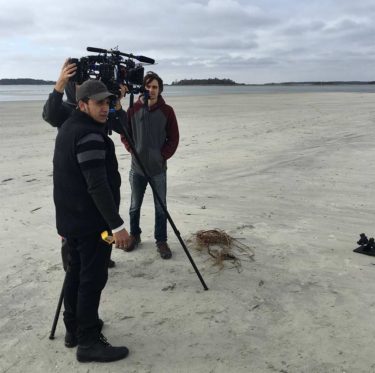 Congrats to Film Connection grad Victor Smith (Atlanta, GA) on his recent gig as a Camera Assistant (AC1 and AC2) on an Olson Pictures production starring an international cast. Of working on the full-length feature, Victor says the experience, “Made me realize, for sure, that this is what I want to do for the rest of my life.” More on Victor’s journey in filmmaking in a forthcoming issue!
Congrats to Film Connection grad Victor Smith (Atlanta, GA) on his recent gig as a Camera Assistant (AC1 and AC2) on an Olson Pictures production starring an international cast. Of working on the full-length feature, Victor says the experience, “Made me realize, for sure, that this is what I want to do for the rest of my life.” More on Victor’s journey in filmmaking in a forthcoming issue!
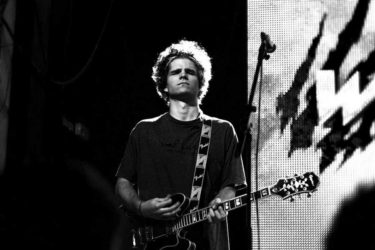 Guitarist and Recording Connection student Nicolas Schilke (Los Angeles, CA) who apprentices at The Lair with Larry Goetz recently had the chance to assist on a session with none other than Weezer! More on this in an upcoming newsletter so stay tuned!
Guitarist and Recording Connection student Nicolas Schilke (Los Angeles, CA) who apprentices at The Lair with Larry Goetz recently had the chance to assist on a session with none other than Weezer! More on this in an upcoming newsletter so stay tuned!

RRFC is education upgraded for the 21st century.
Get the latest career advice, insider production tips, and more!
Please fill out the following information, and RRFC Admissions will contact you to discuss our program offerings:
Stay in the Loop: Subscribe for RRFC news & updates!
© 2025 Recording Radio Film Connection & CASA Schools. All Rights Reserved.


